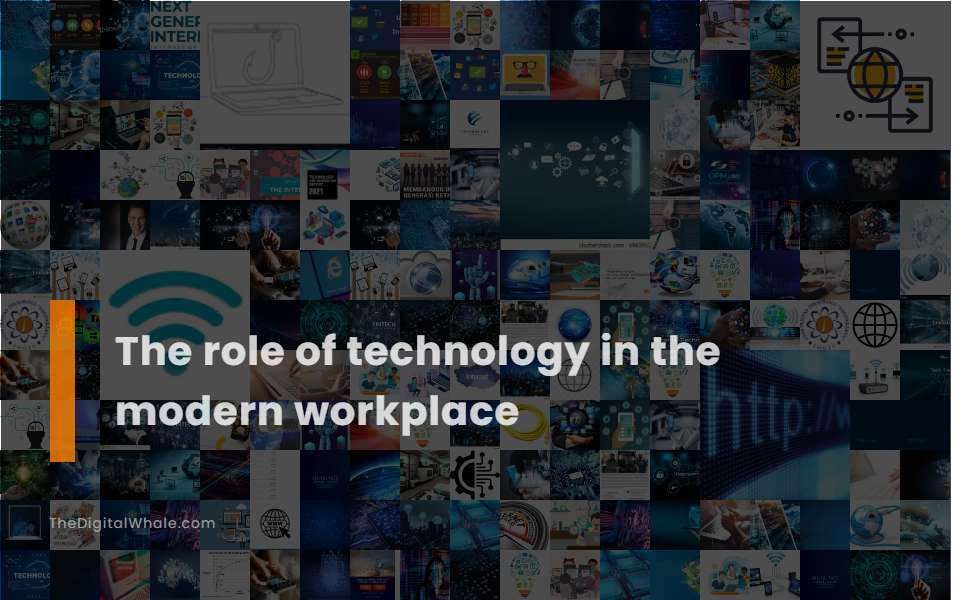The Role of Technology In the Modern Workplace
What are the benefits of using technology in the workplace? What are the benefits of using artificial intelligence in the modern workplace? Let's find out more about The Role of Technology In the Modern Workplace.

Transformation of Workplaces: Technology has fundamentally changed the way we work, communicate, and collaborate.
Technology has fundamentally changed the way we work, communicate, and collaborate, enhancing productivity, flexibility, and efficiency through advancements in remote work, AI integration, and cloud-based collaboration tools. This transformation has redefined the Modern Workplace, enabling global operations, streamlined workflows, and improved customer experiences.
Remote Work and AI Integration: The rise of remote work and AI automation has created more flexible and agile environments.
The integration of AI in remote work environments enhances communication, boosts productivity, and streamlines administrative tasks, while also improving customer support, project management, and security, ultimately creating a more efficient and adaptable work setting. AI tools automate routine tasks, provide personalized learning, and foster a positive remote work culture, revolutionizing how Remote Teams operate and engage.
Evolving Office Dynamics: Traditional offices have evolved into technological hubs of innovation with smart devices and advanced communication tools.
Traditional offices have evolved into technological hubs of innovation, incorporating smart devices, cloud computing, and advanced communication tools to enhance productivity, flexibility, and efficiency. These innovations have not only streamlined tasks but also fostered a culture of continuous learning and digital literacy. To gain more insights into how technology is reshaping work environments, one can explore the impact it has on the Modern Workplace, revealing further dimensions of digital transformation within professional settings.
Automation and AI: Streamlining operations and enhancing productivity through tools like chatbots, AI-powered analytics, and Robotic Process Automation (RPA).
Automation and AI in the modern workplace streamline operations and enhance productivity by automating repetitive tasks, providing instant support through chatbots, and facilitating smarter decision-making with AI-powered analytics and Robotic Process Automation (RPA). These advancements, discussed in detail on YArooms, allow employees to focus on higher-value activities, thereby improving overall efficiency and fostering innovation.
Cloud Computing: Enhancing flexibility, scalability, and data storage, making workplaces more accessible.
Cloud computing enhances flexibility, scalability, and data storage in the modern workplace by allowing rapid scaling of resources, pay-as-you-go cost savings, faster disaster recovery, access to innovative technology, and advanced security options, making workplaces more accessible and efficient. For a deeper understanding of these benefits, you can explore the Cloud Computing Benefits that are essential for modern enterprises looking to optimize their operations.
Related:
What are some of the biggest trends shaping the workforce of the future? What are the benefits of using technology in the workplace? Let's find out more about The Future of Work and How Technology Will Shape It.
Internet of Things (IoT): Enabling smart workplaces through better connectivity and automation.
The Internet of Things (IoT) enables smart workplaces by integrating various devices such as sensors, cameras, and office equipment into a centralized network, enhancing productivity, efficiency, and decision-making through automated tasks, real-time data collection, and optimized resource allocation. For more insights into how IoT is revolutionizing the modern office environment, visit the Revolutionizing the Workplace: IoT for Smart Office Automation blog. This approach not only streamlines operations but also fosters an environment conducive to innovation and growth.
Continuous Learning Culture: Fostering a culture of continuous learning and digital literacy within organizations.
Technology plays a crucial role in fostering a culture of continuous learning by providing flexible and accessible learning resources such as specialized learning management systems, online courses, and social learning platforms. These tools allow for personalized and remote learning, accommodating diverse learning styles and needs, and are essential for driving innovation and growth in the modern workplace. Visit Continuous Learning to explore more on how these technological advancements are shaping the future of education and professional development.
Improved Efficiency and Productivity: Utilizing technology to boost productivity, innovation, and efficiency by automating repetitive tasks.
Technology significantly enhances efficiency and productivity in the modern workplace by automating repetitive tasks, streamlining workflows, and leveraging digital tools such as project management software, time tracking apps, and AI-driven solutions. These advancements can lead to notable improvements, resulting in increased overall productivity and efficiency. For more insights on this topic, visit the HumanSmart blog, which delves into the essential role that technology plays in optimizing workplace productivity.
Enhanced Communication and Collaboration: Using digital tools to facilitate better communication and collaboration among employees.
Technology in the modern workplace significantly enhances communication and collaboration through tools like cloud computing, collaboration software such as Slack and Microsoft Teams, and AI-driven analytics. These tools facilitate real-time communication, centralize information, and enable seamless collaboration across different locations. This evolution leads to increased job satisfaction and a more positive workplace culture. For more insights into these advancements, you can explore the Modern Workplace strategy that technology offers today.
Addressing Challenges: Managing challenges such as employee resistance to change, financial constraints, and ensuring data privacy and cybersecurity.
In today's rapidly evolving business environment, managing challenges in the modern workplace requires a multifaceted approach. Key strategies involve addressing employee resistance to change through continuous learning and engagement efforts, conducting thorough needs assessments to handle financial constraints, and ensuring a positive return on investment. Moreover, prioritizing data privacy and cybersecurity is crucial, which involves implementing robust security measures like encryption and multi-factor authentication, and ensuring compliance with relevant regulations. As highlighted by YaRooms, effective integration of new technologies with existing systems is essential, and organizations must navigate these complexities to sustain growth and innovation.
Related:
What is the impact of electronic health records on physicians' jobs and satisfaction? What is the relationship between information technology and job satisfaction? Let's find out more about The Impact of Technology On Job Satisfaction and Motivation.
